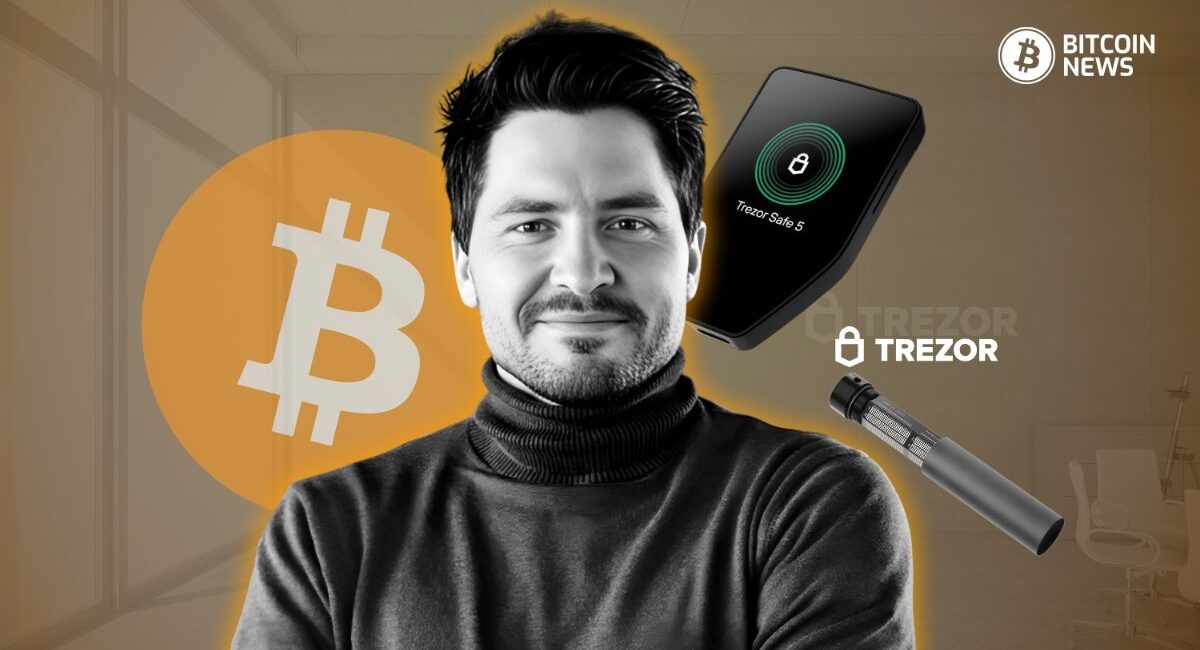Matej Zak didn’t set out to lead one of Bitcoin’s most recognized hardware wallet companies. In fact, his journey started with guitar strings, not seed phrases.
“I actually studied guitar, then music business for my master’s,” Zak laughs. “I wanted to work in startups and eventually start my own business… I was super excited about being the founder, entrepreneur, all those things.”
That passion led him through growth marketing, then into product management, where he joined Trezor as their very first product manager.
Years later, after stints as Head of Product and Chief Product Officer, the founders asked him to take over as CEO. “As ambitious and stupid as I am, I said yes… and I love it.”
Trezor’s roots run deep in Bitcoin history. “The founders were the guys to put BIP39 into the world,” Zak says, referring to the standard that gave us the familiar 12- or 24-word recovery phrases.
“The whole industry of self-custody wallets adopted it, hardware and software alike.” They didn’t stop there. “We innovated more on SLIP39, where you can distribute multiple shares of the seed and recover the master secret from them.”
For Matej Zak, security is only part of the equation. “The three pillars of self-custody for us are security, usability, and privacy. If one of them is crippled, the whole thing crumbles.”
When he joined, there wasn’t even a full-time designer. “It was 30 or 40 engineers, geeks excited about technical solutions. Now we’re very much a product-oriented company. We still build for high functionality, but the products are also beautiful.”


Running a hardware wallet company means riding bitcoin’s wild price cycles. “It’s not linear growth,” Zak says. “You have to plan for bull and bear years.”
For hardware, that also means managing inventory that can take six months to produce while bracing for sudden demand spikes when bitcoin price rips or when a major exchange implodes.
“FTX‘s collapse? Sales spike. Silicon Valley Bank? Same. People realize it makes sense to be in self-custody. You don’t want centralized risk.”
And yes, Trezor’s sales track bitcoin’s price quite closely. “When price is pumping, that’s when people want hardware wallets,” he says without hesitation. “The only exceptions are big hacks, those get people moving fast.”
As the CEO of a company doing everything in its power to help people protect their bitcoin, Zak had some helpful words on best practices people should be keeping in mind when securing their own money.
“Use a hardware wallet. It doesn’t have to be ours, but you need cold storage that’s user-friendly.” Store your seed phrase offline, never digitally, never shared with anyone. “We even make metal backups that can survive 2,000°C. Follow the instructions we give you, and it’s hard to make a mistake.”


If you buy a wallet, Zak advises going directly to trezor.io or checking their list of authorized resellers. “We have tamper-evident seals, if they’re peeled, contact support. It might be nothing, but we’ll replace it if needed.”
Phishing is still the number one threat. “Please never ever write those words in any digital format, and never share them,” Zak stresses. “Trezor support will never ask for them. Don’t fall for shi*** phishing emails or sites.”
He hints at new anti-phishing measures in the works but won’t spill details just yet: “The marketing people would kill me.” He said there are new developments in this regard, with an announcement scheduled for this fall.
To educate users further, the team even did a Twitter thread on phishing awareness.
Inside Trezor, AI is being leveraged to improve workflows and continue building great products.
“The engineering team uses it heavily. We have a generative AI support chatbot that resolves a lot of customer questions, it’s a big money saver and great for scaling. I use it all day long for research, summaries, you name it.”
The research capabilities are particularly powerful for market analysis and user behavior statistics, though everything needs verification.
“You always have to double check and cross-examine whether those things make sense,” Zak notes. “It’s hard to verify whether the data is correct, but from a managerial perspective, it’s incredibly useful for summarizing text and countless other daily tasks.”
If Matej Zak could ask Satoshi Nakamoto one question, he wouldn’t ask about price predictions or personal identity.
“I’d want to know if you knew adoption would be this massive, would you make Bitcoin truly anonymous, not just pseudonymous? Would you see that as a deficiency or as fine for some reason?”
It’s a fascinating question that gets to the heart of Bitcoin’s design philosophy. Looking back at the early forums, Satoshi did wrestle with privacy considerations, even advising users that “For greater privacy, it’s best to use bitcoin addresses only once.”
It is a delicate balance between privacy and the revolutionary concept of a public, auditable monetary system that requires no trusted third parties.
As for the future, Zak’s mind is on two things: better phishing protection and inheritance solutions.
“As the OGs get older, more people will ask: what happens to my bitcoin if I die? It’s going to become more and more relevant.” Beyond inheritance solutions, Zak sees promise in Bitcoin’s growing corporate adoption, though his heart remains with retail users.
“I’m still an OG believer in peer-to-peer electronic cash in the P2P sense,” he says. “It’s our role as a company to support those use cases, for people to actually pay with bitcoin, not just hold it.”
From guitar performance to leading a company with millions of devices securing bitcoin worldwide, Zak’s path reflects the same evolution as Bitcoin itself: creative beginnings, scrappy early builds, and a relentless drive to make securing value possible for anyone.
“It makes sense to hold your own keys,” he says. “Everything else we do is just making that harder to break.”
It’s a fitting philosophy from someone who’s spent years watching Bitcoin evolve from a cryptographic experiment into a global financial force. The world around Bitcoin might get more complex, but the core principle stays beautifully simple: “be your own bank.”



No Comment! Be the first one.